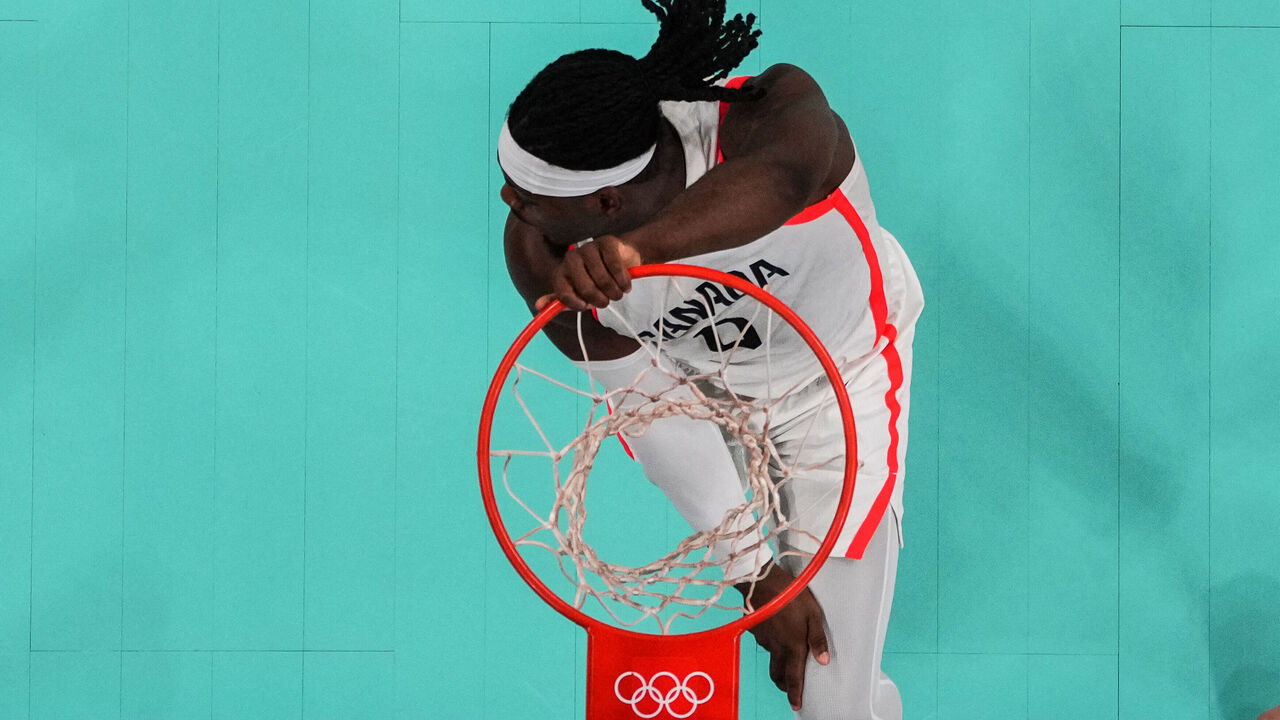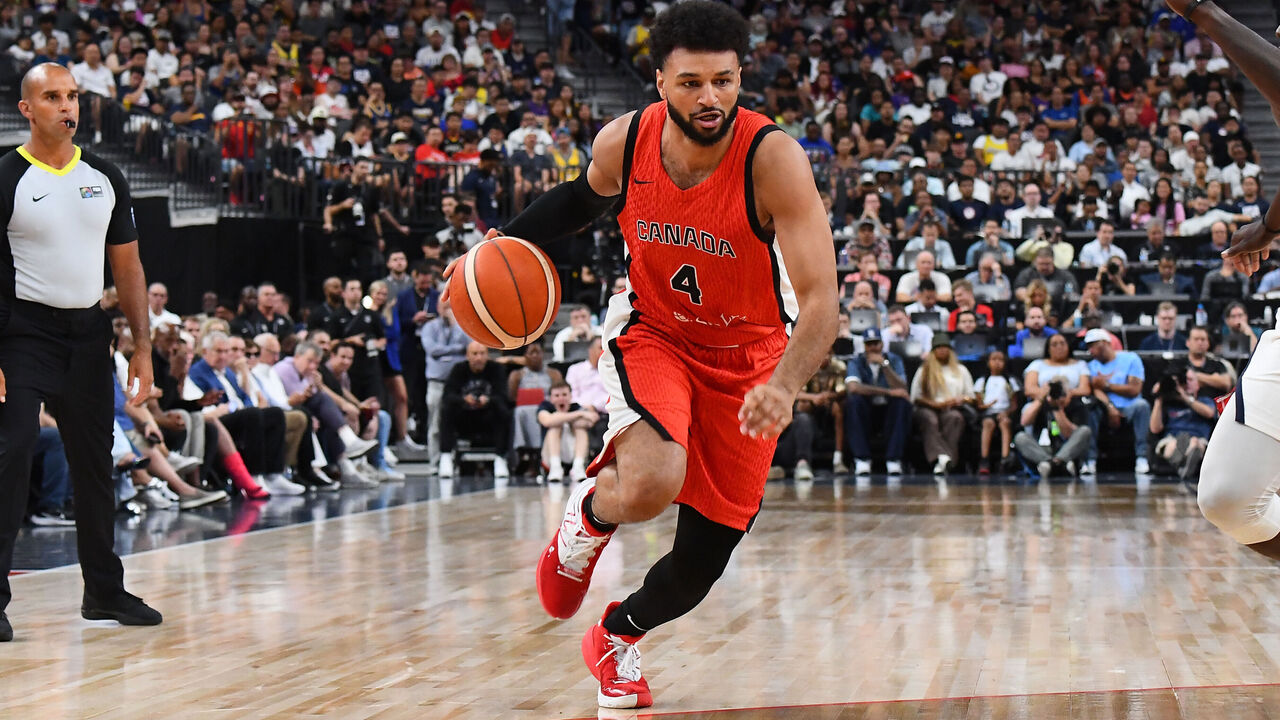Off and running: 5 takeaways from Canada's 2-0 start in men's hoops
In the country's first foray into men's Olympic basketball in 24 years, Canada has jumped out of the gates with two wins over Greece and Australia to put itself atop Group A. Here are five thoughts on what we've seen so far.
2 very different wins
Canadian basketball fans had gotten used to disappointment over the last quarter-century, even when the talent started coming in waves. These games against Greece and Australia are exactly the type of contests Canada always found a way to lose before breaking through for a bronze medal at last year's FIBA World Cup.
The Canadians survived their best defenders being in foul trouble and a late Greek onslaught to go wire to wire against a dangerous Greece squad led by Giannis Antetokounmpo (and shooters). Against a more balanced Australian side, it was team MVP Shai Gilgeous-Alexander who found himself in early foul trouble as Canada played from behind for much of the first half. An explosive third quarter and some lineup tinkering saw the team pull away for a double-digit victory anyway.
There have been moments of tension, as expected. In the toughest group of the deepest international basketball tournament ever staged, nothing will come easy. But Canada has found a way to win two very different games against two very different opponents to essentially assure themselves a quarterfinal berth. This is what Canadian fans have been waiting for.
The starting lineup

It was assumed Jamal Murray would start alongside Gilgeous-Alexander to give Canada arguably the best backcourt in the tournament. Instead, SGA's defensive-minded Thunder teammate Lu Dort has gotten the call, with Dillon Brooks, RJ Barrett, and Dwight Powell rounding out the starting five.
When that lineup debuted against Greece, I thought it was perhaps to give Canada more options to throw at Antetokounmpo. But then the same five started against Australia, and honestly, it makes sense. There are no defensive weak spots to exploit. The four guards and wings starting alongside Powell are virtually interchangeable defensively, with each capable of guarding up a size or two - a welcome quality for a team that lacks interior size.
Dort's improved shooting also means the team doesn't have to sacrifice its offensive spacing by benching Murray. It would be nice to have a second ball-handler out there, but perhaps it's more important to make sure Gilgeous-Alexander is driving the bus on as many possessions as possible. Plus, Barrett has looked plenty capable of serving as the secondary attacker, creator, and playmaker. The Raptors swingman has been Canada's leading scorer in both games.
Right now, this lineup works (with Dort a team-leading plus-41 in 40 minutes). Maybe that will change as the tournament continues and the team evolves, but Murray will also have to play a lot better if he's going to snag a starting spot or even a consistent place in closing lineups.
The 1 glaring flaw
We always knew that size and the general quality of Canada's big men would be the team's Achilles' heel, especially with Zach Edey not in the mix. That hasn't changed through two games of Olympic basketball.
Powell had a strong finish to Tuesday's victory over Australia, but Kelly Olynyk and Trey Lyles have been weak spots so far, combining to shoot 2-for-12 while missing a few easy looks and not exactly standing out defensively. Overall, Canada has survived in the paint and on the glass (76.1% defensive rebound rate versus 76.8% opponents' DReb rate) thanks to a collective effort. But potential matchups versus the U.S., France, and Serbia could present interior challenges this roster is ill-equipped to solve.
For now, perhaps Fernandez found something in Khem Birch. The veteran logged eight good minutes in the second half versus Australia and might've just usurped Olynyk and Lyles in the team's rotation. One advantage Birch has is his comfort playing the FIBA game, as the former NBAer finished last season playing in the Spanish league. That familiarity was on display in the closing minutes on Tuesday, as Birch knocked a ball off the rim without hesitation, leading to a big defensive rebound for Barrett.
It was one moment across 80 minutes of basketball thus far, but you'd be surprised how many full-time NBAers still hesitate before pulling rebounds off the rim (which isn't allowed in the NBA) in international contests. Those split-seconds of indecision can cost teams.
Need more from bench

Canada's depth of NBA talent - second only to the Americans - was supposed to be a strength, but it's yet to pay dividends. While the starters have been excellent, Birch had his moment against Australia, and Andrew Nembhard was solid against Greece, the bench has by and large been bad (if not disastrous).
Again, Murray needs to be better (though he's had a couple of nice defensive moments against bigger players), but Canada also needs more from Nembhard and Nickeil Alexander-Walker if the team is to achieve its goals. Alexander-Walker, in particular, has been slumping for months. His minutes dwindled in Minnesota's conference finals loss to Dallas, and he has yet to regain his form or rediscover his jumper since, missing all seven of his field-goal attempts so far for Canada.
No such thing as garbage time
In a tournament setting where point differential could come into play, there's no such thing as a meaningless bucket. Canada has already boosted its differential by five points on two baskets that would rarely have been attempted in the Association. Against Greece, Barrett threw down an emphatic dunk rather than kill time in the closing seconds of what was already a two-possession game. Versus Australia, Brooks sunk a 3-pointer with five seconds remaining against a team that had already conceded. Those two buckets are the difference between Canada being plus-17 rather than plus-12 through two games.
Remember, in addition to potentially breaking ties within each group, point differential could help determine how quarterfinalists are seeded. Assuming the U.S. finishes as the top overall seed, Canada will need to finish as the second-best group winner if the team wants to avoid the American side of the bracket and delay that matchup until a potential gold-medal clash.
Joseph Casciaro is theScore's lead Raptors and NBA reporter.